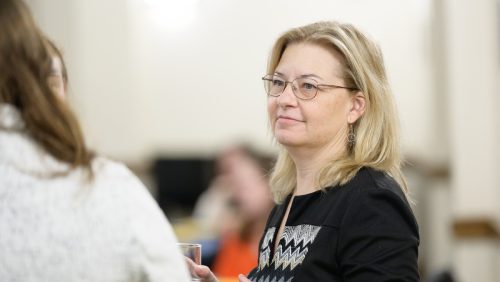Bringing the Society of Women Engineers to Trinity
Susan Thomas Schlett ’84

My journey, my four years at Trinity College, was not an easy one. I tell people I majored in engineering and minored in academic probation (because I was on it, more than I was off of it!). Nonetheless, I was the only woman in my class to earn an engineering degree. I may have been the 13th woman to graduate from Trinity with an engineering degree, but I never considered it an unlucky number.
I grew up in the small town of Coventry, Connecticut (which is about 20 miles east of the College), where I graduated high school second in my class. I had a keen interest in math and science, and my middle school principal, Edward Mahoney, encouraged me to check out Trinity during my college search (he had a daughter already attending, Mary Ellen “Minnie” Mahoney, and another daughter, Anne Mahoney, who was the same year as me, who I ended up rooming with). After touring this prestigious liberal arts college and its relatively small Engineering Department, the atmosphere really appealed to me, and I matriculated with the Class of 1984.
Unbeknownst to me, one of the Trinity engineering professors, August “Gus” Sapega, had a strong desire to attract more women to the engineering program. He went so far as to network with the local Hartford section of the Society of Women Engineers (SWE, a nonprofit educational organization founded in 1950), for their support and guidance. Gus and the other all male engineering faculty at that time became members of SWE (very impressive since SWE had just allowed males to join the organization in the ’70s!). The women in the Hartford section were very supportive of me while I was at Trinity. They would phone me periodically to see how my studies were going and encouraged me to maintain perseverance! The Hartford SWE women encouraged Gus and his allies to apply for what is called a SWE charter so that we could have an official SWE collegiate section at Trinity College. To help make this happen, as a sophomore, I traveled with an upperclassman and one of the Hartford SWE professionals, Joan Dannenhoffer. The three of us drove from the campus in Hartford, Connecticut, all the way to our very first SWE conference in Detroit, hoping to network with other SWE members and present our request for a SWE charter. We were not granted the SWE charter immediately because the school was not ABET accredited in engineering at that time, but we were eventually granted a conditional SWE charter because Trinity had an affiliation with Rensselaer Polytechnic Institute and a five-year master’s program. Trinity was given a SWE charter in 1983 by then-SWE president Evelyn Murray, and I became the first Trinity collegiate SWE section president.
While in college, I was rather shy and for the most part studied alone. I would go to career guidance for help, and their directive to me was typically, “Change your major!” But I didn’t want to change my major! I just needed help. Thankfully, people such as Dean David Winer helped arrange a tutor for me, and I was able to graduate in 1984 with an engineering degree.
Just prior to graduation, I applied for engineering jobs. I attempted to get an interview with local company Pratt & Whitney and was denied. This did not sit well with my father, who worked there his entire career and was still there at this time. But it was P&W’s policy at that time not to interview students graduating from non-ABET engineering programs like Trinity in 1984. During those job searching months, I led a group of my classmates, now SWE members, on a trip to tour Sikorsky Aircraft (which was a United Technologies Corporation member at the time) and gave Sikorsky personnel my résumé. Because of that SWE trip to Sikorsky, I received an interview and subsequently landed a job that I loved and remained in for 15 years. Sikorsky was able to overlook my subpar grades and our Colleges’ non-ABET engineering status amid my valuable perspective and perseverance. I proceeded to lead teams of UTC members to recruit at SWE conferences every single one of those 15 years.
Following my college graduation, the Trinity College Engineering Department formed TEAC (Trinity Engineering Advisory Committee), and I was extremely flattered to be invited to serve on the inaugural committee. At one of the first TEAC meetings, we were asked what could be done to strengthen the Engineering Department, and the first thing out of my mouth was, “You need to become ABET accredited!” I am so proud to report that they immediately set out to start the accreditation process and have been ABET accredited in engineering ever since.
Happy 200th anniversary Trinity College! Happy 40th anniversary to the Trinity College SWE Section!